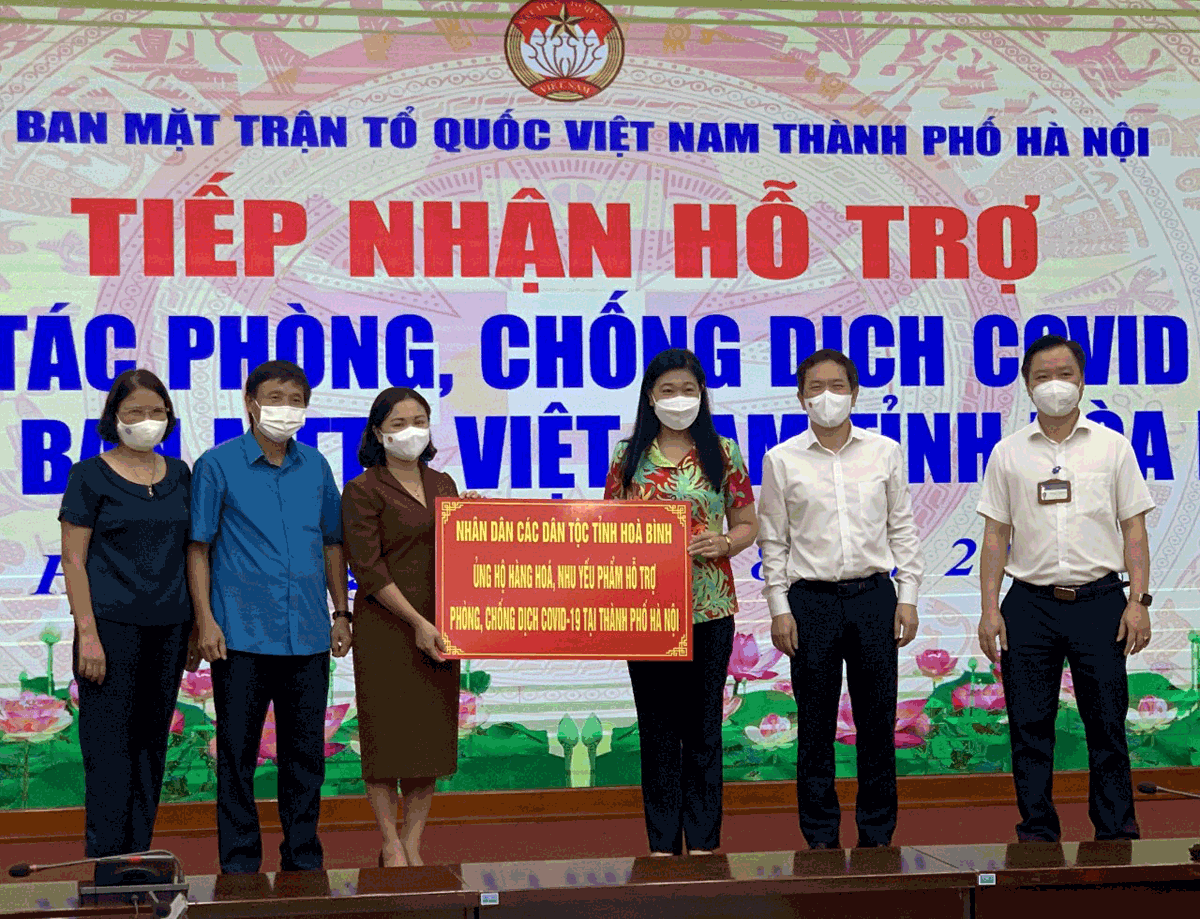
(HBO) - In the afternoon of August 13th, the leaders of the Provincial Fatherland Front handed over 70 tons of goods and necessities to support the capital in the prevention and control of Covid-19 pandemics through Hanoi Fatherland Front. These goods originated from the source of calling and mobilizing people from all walks of life in the province to support people in epidemic areas and were extracted from the province's Fund for Covid-19 Prevention & Control.

The leaders of the Provincial Fatherland Front are giving over 70 tons of goods and necessities to support the capital in the prevention and control of the Covid-19 pandemics through Hanoi Fatherland Front.
The donated goods included 65 tons of rice and more than 5 tons of necessities (instant noodles, rice noodles, peanuts, pumpkin...) with the hope that Hanoi would soon overcome difficulties in the epidemic prevention and control. Hoa Binh province hoped that the donated goods would be promptly delivered to support the poor, the self-employed, the students who were "stucka” and Hoa Binh people having difficulty implementing social distance in Hanoi.
Making a speech at the receipt of the goods the, Chairman of the Hanoi Fatherland Front, Ms. Nguyen Lan Huong thanked the attention, sharing and attachment of the people and the officials of Hoa Binh province for the capital. Hanoi Fatherland Front would coordinate with Hanoi Capital High Command of the Poeple’s Army to promptly transport these goods and necessities to the poor and disadvantaged people facing difficulties. They would coordinate to organize a "zero dong market” in the blocked and difficult places to support the disadvantaged with the goal that every poor person would be supported.
Hoa Binh province is undergoing a dynamic transformation amid Vietnam’s national digital transition. Building on Poliburo’s Resolution No. 57-NQ/TW on breakthroughs in science, technology, innovation, and national digital transformation, the province has rolled out a wide range of practical action plans. A standout initiative is the "Digital Literacy for All” movement, an effort to ensure that no one is left behind in the digital era.
Hoa Binh province is undergoing a dynamic transformation in the wake of the national digital transformation movement. Building on Resolution No. 57-NQ/TW of the Politburo on breakthroughs in science, technology, innovation, and national digital transformation, the province has implemented a wide range of practical action plans. A standout initiative is the "Digital Literacy for All” movement ambitious effort to ensure that no one is left behind in the digital age.
With a spirit of unity and proactive problem-solving, the Party Committee, the government and the people of Dong Lai Commune (Tan Lac District) have made great strides in implementing the resolutions of the 24th Party Congress of the commune for the 2020 - 2025 term. Focusing on leadership and practical actions, the commune has brought the Party’s resolutions into daily life, creating strong impacts and pushing the local development forward.
Amid the nationwide push for digital transformation, young people in Hoa Binh Province are stepping up as dynamic pioneers, applying technology to enhance Youth Union operations and expand the reach of youth-led initiatives. Through creativity and adaptability, Youth Union organizations at all levels have introduced a series of practical solutions, contributing to modern governance and community development.
In recent years, An Nghia commune, located in Lac Son district, has stepped up administrative reform, focusing on improving the quality and efficiency of its single-window service unit for receiving and processing administrative procedures. These improvements have helped create favourable conditions for local residents and organisations to handle administrative procedures, contributing to the commune’s broader socio-economic development.
The Prime Minister-approved master plan to develop the multi-use value of forests ecosystems through 2030, with a vision to 2050, aims to improve the management and sustainable use of forest resources, create jobs, increase incomes, and improve the living standards of ethnic minorities, people in mountainous and remote areas, forest workers and those living near forests.



